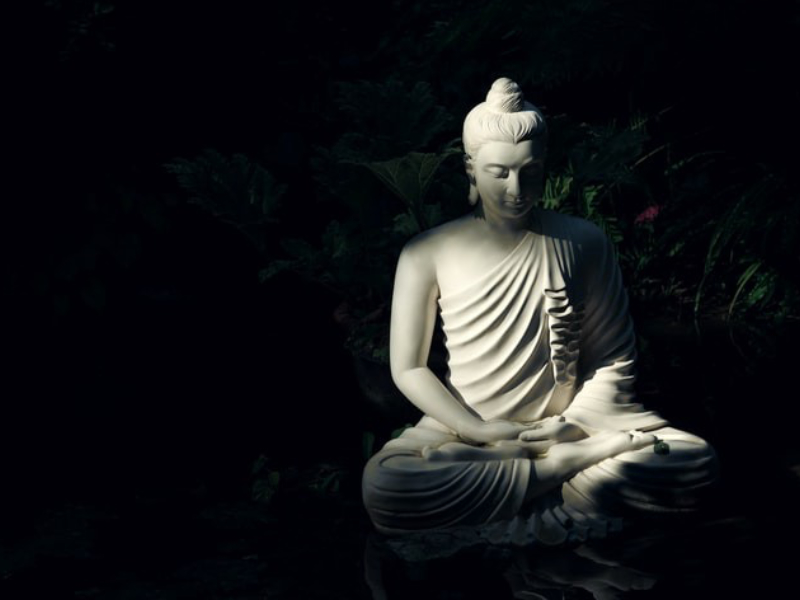The Tranquility of Non-Addiction
– Noble Eightfold Path | Thoughts of Renunciation –

TODAY, WE WILL CONTINUE our exploration of thought as it relates to the Buddha’s Eightfold Path. To quickly recap, in the last episode, we went over some general exercises to begin opening us to the world of thought. Specifically, I invited you to start organizing your thoughts into two camps: (1) those motivated by goodwill and (2) those by ill-will.
I asked you to explore the energetic imprints and consequences of these two types of thought. And suggested that, as you move toward thoughts of goodwill, you will find more happiness and ease in your life, which in turn will lead to more concentration and awareness, which in turn will lead to more wisdom, insight, and understanding, which will lead to yet more peace and joy, and so your life will spiral upward.
I also emphasized that thoughts shape our morality, our footprints on the world. And that thoughts, or aims and intentions, in turn, both shape and are shaped by our worldview, our understanding, our beliefs. So, when our views haven’t been rigorously examined, when we see only the surface appearance of experience, when our understanding doesn’t align with the Dharma, then our intentions will lead to unhelpful, if not harmful, actions and consequences, both internally and externally.
If, for example, your view of the good life is measured in terms of wealth, status, or possession, then you will aspire to no more than wealth, status, or possession. The result isn’t happiness, peace, or freedom. It’s suffering, suffering born out of unexamined intentions, out of a delusion that has you centered in greed, centered in suffering. And as you work toward this aim, you are also creating the conditions to hurt others, since your end is not the peace and happiness of yourself or others, but merely wealth, status, or possession. What’s the cost of this aim?
It is through understanding that our suffering is liberated, through understanding the Four Noble Truths — the truth of ill-being and its cause, and the truth of well-being and its cause. And again, an understanding not born from dogma but from your own direct investigation.
* * *
What thoughts and intentions unfold when you examine directly in your own life the Four Noble Truths?
Renunciation, Kindness, & Compassion
Find out for yourself. But I’ll bet you, one, that when you apply your direct understanding of the Four Noble Truths to your self, to your own situation, to your own interior, this understanding will lead to thoughts or intentions of renunciation.
When we see how our lives are saturated with dis-ease and agitation, and we understand from our own direct investigation that this dis-ease comes from craving or clinging to things, the mind naturally begins to move toward renunciation. Stockholm Syndrome no longer deludes us and we stop clinging to that which keeps us imprisoned, to that which strips us of our joy, peace, and freedom.
And, two, when you apply it to your relationship with the world and to your relationships with others, you will experience more and more thoughts or intentions of loving-kindness and compassion. But we’ll explore these another time.
Today, we’re going to explore thoughts or intentions of renunciation and how these thoughts or intentions can blanket us with an overwhelming sense of peace, joy, and freedom.
Renunciation
The first thing I should say about renunciation, which the Buddha said himself, is that we shouldn’t let go of our desires because our desires are morally evil, but because, when we cling to them, we suffer.
Now let me be clear, I’m not asking you to leave everything behind to go join a monastery. I’m not even asking you to abandon all your desires, like chocolate or coffee or hot showers. Desires in themselves, again, are not bad. Desires only become a problem when we cling to them.
My intention is simply to point you to the guiding principal: our suffering is alleviated by eradicating craving in our lives, and progress in this direction is made to the extent we overcome craving. This will inevitably necessitate renunciation.
The Intention of Seeking Truth
One of the biggest obstacles we face with renunciation is that when we try to let go of attachment, we often encounter a powerful inner resistance. The mind does not want to let go. After all, it has cultivated a strong habit over many years to gain, grasp, hold onto, and posses its desires, that which brings it comfort and pleasure. At first, it might seem impossible to break this habit. You might even agree it’s necessary to find lasting peace, and may even want to leave craving behind. But when it comes down to it, the mind recoils and hardens its grip around the desire.
How, then, do we break the chains of craving?
One way that has been tried with little to no success is to repress our desires, to drive them away out of fear, disgust, and hatred. The problem here is that this method doesn’t resolve the problem but only pushes it deeper inward, where it grows in the shadows.
The Buddha offers another way: the way of understanding. Here, genuine renunciation does not force us to give up things we cherish. It asks us to change our perspective of them so they no longer imprison us. When we understand the nature of desire, when we investigate it directly within ourselves with an open and caring attention, we discover that desires, like all things, fade away all on their own, without effort or struggle. When we see with wisdom the impermanent, selfless, ever-changing nature of reality, we see that there is in fact nothing to cling to. It’s like trying to reach your hand in a river to catch and hold onto it.
Again, we remain prisoners of desire because we view and believe it to be our means to happiness. So, what we need is a shift in understanding, a shift in our view, beliefs, and perspective.
We need to look past the surface appearance of things. Rather than view the world and its many objects in terms of what they can do for us, rather than see the world through the lens of our self-interests and -wants, we need to dig deeper, we need to look through the lens of ‘what is true.’ It’s easy and automatic to discover and acquire what is pleasant; it is the pleasant, unpleasant, and neutral feeling tones that condition so much of our unconscious behavior.
But don’t you want to be more than an ‘if, then’ algorithm? Don’t you want to be free? Look with more than the intention to acquire the pleasant, then. Look with the intention to discover truth. Though this may cost us some immediate comfort, lasting security and peace always lie on the side of truth, not on the side of comfort.
Desire = Discontented | Renunciation = Contented
When we investigate desire directly and honestly, when we move past the surface, we discover that dukkha constantly lurks in its shadows, often as a steady strain of discontent. Desire and dukkha are always interwoven. Just consider the process of wanting. At the moment a desire arises, we feel a sense of lack, the pain of want. So, to end this pain, we try to fulfill the desire. And if we fail, we get frustrated, disappointed, and sometimes even collapse into despair or depression.
On the other side, even if we satisfy our desire, dukkha’s still there. We worry about losing our new possession, and so we fortify it and cling to it. Or, after we get our hit of pleasure, we try to get another; we look for more more and more of it, or try to get higher doses of pleasure. But, like all things, the pleasant feeling it brings about is impermanent. Often it lasts for only a fraction of a moment. Whether the desire is sex, food, wealth, power, or a relationship, loss and the pain that accompanies it is inevitable.
Reflecting on the dukkha that is inherent in desire is one way to move away from desire and toward renunciation. Another way is to reflect on the benefits of renunciation. It is not, as you likely imagine, to move away from happiness to grief, from abundance to destitution. It is to untie yourself from an entanglement in crude and quickly passing pleasures to a steady and reliable happiness and peace. It is to pass from slavery and bondage to self-mastery and freedom.
Look for yourself and see that, under the surface, desire breeds fear, dis-ease, and sorrow, and that renunciation builds fearlessness, ease, and uninterrupted joy.
The Buddha called the blessing of renunciation a cleansing of the mind. Just like when you fast and clear the body of toxins and contaminants, renunciation brings a purity, clarity, simplicity, and contentment to the mind that stands in stark contrast to the busyness, clutter, and constant nagging desires of everyday life.
Reframing Renunciation as Non-Addiction
To many of us, especially in the West, renunciation sounds bleak and dreary. It brings up feelings of repression, lack, deprivation, and scarcity. So, we naturally meet it with resistence. But really, what we’re trying to capture here is living without addiction. I’ve found this reframe, offered by Joseph Goldstein, to be very helpful in my own practice.
We’re all familiar with a mind that’s caught up in addiction. It’s no fun. We say and do things we otherwise wouldn’t, and end up hurting ourselves and others, often even those we hold most dear. It can be or feel like a total disaster when we don’t satisfy our addiction. We have no freedom. We live out of desperation and lack and fear.
Again, in the moment of gratification, our addictions do give us pleasure. But then we grasp at them, and feel the lack when the pleasure fades. So, we reach for them again and again, or we look for some other momentary satisfaction, and then another and another, until we’re drowning in desire.
I invite you to look at your daily habits and see how hard it would be to let each of them go.
And I want to widen your lens here to include some habits you may not have thought of. In addition to habits, penchants, and proclivities around food, drinks, sex, masturbation, drugs, movies, and music, also consider habitual tendencies around comfort, work, esteem, wealth, power, dress, organization, cleanliness, and control.
What about your phone, email, and social media? Can you put those down?
What about moods, mind-states, or emotions? Are you addicted to calm, excitement, rapture, or even to fear, the thrill of watching a scary movie or going to a haunted house?
Is it a habit to expect your meditation to go a certain way? Are you addicted to your meditation practice itself? Do you get grumpy if it’s interrupted or if you’re not able to fit it into your schedule?
What about the habitual quality of your attention? Investigate that. Is the habit of your attention scattered and racing? Is it tight, rigid, and strict? Is it relaxed and casual, a bit dull and lazy?
Can you renounce proliferating thoughts, particularly thoughts of “I-me-mine,” and instead come back to the simplicity of the moment — to the seamless and interconnected ever-changing field of sounds, sensations, perceptions, feelings, thoughts, and emotions?
Also consider if you’re addicted to wanting itself. Do you find yourself scrolling through Amazon or Etsy, or walking through Target, though there’s nothing you need? You’re not alone. We all find enjoyment in wanting. The wanting is what gives us a hit of dopamine.
Again, look at your habitual patterns for the day, your email, social media, phone, coffee, and sleep habits, and see what it would take to change those habits. You might be surprised at how hard it is to skip your hot shower, say, or your morning coffee. But go ahead and practice letting it go. See if it opens some space in the mind.
As Joseph Goldstein says, renunciation aerates our lives and our habits. It allows for the biodegradation of those habits that no longer serve us. It clears space and provides the energy necessary for new growth.
The Wisdom of “No” | Wise Restraint
Another very helpful practice I learned from Joseph Goldstein is what he calls the Wisdom of ‘No.’ Often in meditation and spiritual practice the emphasis is on acceptance and surrender, which is an extremely important concept and aspect of spiritual life. But sometimes we get stuck in this framing and forget to recognize and acknowledge that some things just aren’t helpful. They don’t lead to peace, freedom, and happiness.
So, it’s important to also learn the practice of saying ‘no’. This is an art. We need to learn how to do it from a place of wisdom, from a place of love, kindness, and interconnectedness. When we say no with wisdom, we’re not being oppressive or avoidant. It doesn’t mean we push things away or deny their presence. We don’t cast judgments at or have aversion to what’s arising.
With the ‘wisdom of no’, or what Buddhists call ‘wise restraint,’ we open to everything in our experience. But with clear comprehension, we discern which thoughts, mind-states, situations, and actions are skillful and which are not, which bring peace and happiness and which bring suffering. And we turn away from those things that add to the world’s suffering, not out of hate but out of love.
You who are parents will be familiar with this. It’s like saying ‘no’ to our kid who is about to do something harmful. It’s a ‘no’ of care, love, and concern. Like Goldstein says, be aware of the mind’s inner two-year-old. Be a wise and loving parent to yourself. Remind yourself, ‘no’ that’s not a good idea.
Again, Sawyadow U Tejania suggested practice is useful here. As you watch proliferating or repetitive desires, ask ‘is this helpful or harmful? Does this support my freedom or take it away?’ Allow the power of no to become the expression of a free mind.
See if you can settle back and allow desires to arise and pass on their own, without reacting to them. And try to notice that moment when you go from being lost in wanting to being free from it. Does it feel like you’ve been let out of the grip of something? Do you open to a more expansive, spacious, and easful awareness? Feel and know for yourself the greater sense of ease in not wanting than in wanting.
Conclusion
As you continue to explore the Dharma directly for yourself, as you open more and more to the mind-body process, your mind will gradually steer away from the tyranny of desire. This of course won’t happen suddenly, but bit by bit, with persistent practice, I think you’ll discover that intentions of renunciation will continue to exile intentions of desire.
Renunciation promotes every arena of training in the eightfold path, it really captures the whole of Dharma practice, it asks us to surrender every thing until, finally, we dissolve into the undivided Whole.
“There is a reality. You are that reality. When we understand this, we see that we are nothing. Being nothing, we are everything.” — Kalu Rinpoche
May you embody lasting peace,
More Articles
“The Art of Bare Attention”
Today we’re going to talk about the ancient Buddhist practice vipassana, or insight meditation. Now, just to be clear, this is an entirely secular practice. It doesn’t require you to adopt any dogmatic beliefs…
“The Faceless Seer”
How do you hold your love? Do you hold her from stillness, with nowhere to go, with nothing to do? How do you hold your love? Do you hold her with acceptance, with open hands and arms, with unabashed…
“Everything Changes”
It’s no secret everything changes. Your experience this morning isn’t your experience now. Yet how many of us act like we really understand this? How often do we grasp onto the illusion of things…
“The Divine Connection”
How do you hold your love? Do you hold her from stillness, with nowhere to go, with nothing to do? How do you hold your love? Do you hold her with acceptance, with open hands and arms, with unabashed…






